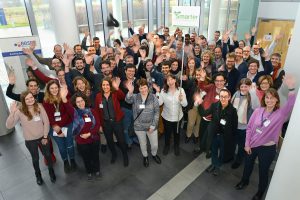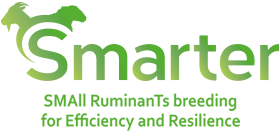
This project has received funding from the European Union’s Horizon 2020 research and innovation programme under grant agreement No 772787.
SMARTER 1st Annual Meeting in Edinburgh, United Kingdom!
The 1st SMARTER annual meeting took place on 26-29th November 2019 and was hosted in Edinburgh, Scotland, by the Roslin Institute of the University of Edinburgh. The meeting brought together 76 participants representing the 27 partners and 16 different stakeholder’s organizations involved in the project.
On 28th November the meeting began with a warm welcome introduction by Roslin Institute and SRUC, followed by a general report by the coordinator, Carle Moreno on the situation of the project at the end of its first year, and a factual report by the project manager on the project key dates for the 2nd year.
- A plenary session was organized then in order to present to everybody an update on the situation and the progress of each of the different work packages of the project.
- In parallel 8 posters were stuck up at the Roslin Institute and presented again during the social dinner, concerning the first important results (see below the reports of the different WPs) and different questions which the task leaders wished to underline (such as the open access issue, and the CDB Fitter Livestock Farming).
- Then workshops were organized during the afternoon of the 1st day and the morning of the 29th November to give the participants time for involvement in the strategies of each work package. The main results of these workshops were a planning of the tasks to be conducted during the second year of the project, and a better identification of the interactions between tasks and WPs at this stage of the project.
- The main part of the afternoon of the 2nd day was devoted to 3 hours meeting with the stakeholders of the sheep and goat sector which are closely associated to the development of the project, in order to make it known and to integrate their needs and advices in SMARTER. 16 stakeholders took part to this meeting, in face to face or on remote by video-conference.
- It was followed by a two-days sheep and goats farms visits on 28th and 29th November organized to give the opportunity to the attendees of the 1st AM to learn about breeding practices in the UK and the breeders needs (see the reports below).


